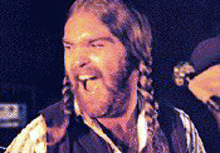
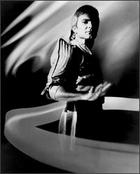
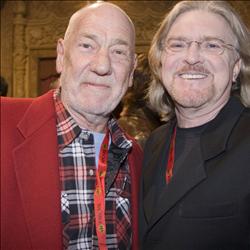
| MILESAGO: Australasian Music & Popular Culture 1964-1975 | Groups & Solo Artists |
BILLY THORPE / THE AZTECS
Sydney-Melbourne-USA 1963-2007
 |
 |
 |
Billy Thorpe (vocals, guitar, harmonica) backed by:
|
Aztecs Mk I, 1963-1965 The Aztecs Mk II, 1965-1966 Aztecs Mk III, 1968-70 |
Aztecs Mk IV, 1970-72 Aztecs Mk V, 1972-73 Aztecs Mk VI, 1973-75 |
History
1963
William Richard Thorpe was born in Manchester, England and emigrated with his family to Brisbane in the fifties. A precocious child performer, he participated in amateur talent quests as a yodeller and sang at local dances. He performed as a youth under the pseudonym 'Little Rock Allen' and played on bills supporting the likes of Jerry Lee Lewis and our own Johnny O'Keefe. The yodelling quality to Billy's voice can be heard in the vocal style of some of his early recordings.
Billy moved to Sydney in early 1963 and soon auditioned for singing work at the premier beat-music venue of the day, Surf City in Kings Cross. His backing band for these auditions was Sydney instrumental group The Aztecs. They had formed from the remnants of two popular Sydney surf-instrumental outfits, The Vibratones and The Sierras. Billy's strong voice and charismatic stage presence impressed the Aztecs, who immediately offered him the job of lead singer. They quickly gained the attention of entrepreneurs keen to spot "the next big thing" and the newly-christened Billy Thorpe & The Aztecs rapidly became a popular drawcard on the burgeoning Sydney beat-dance circuit, and set about honing their sound.
The group was offered a recording arrangement with the small
independent label
Linda Lee,
and in the closing stages of the year
they recorded the tracks that became
the first single.
1964
The first recorded output from the band appeared in April of 1964. "Blue Day" was written by rhythm guitarist Tony Barber, and displayed his nascent songwriting skills. The record garnered moderate notice on Sydney radio, but became a hit when it was re-released in the wake of The Aztecs' subsequent breakthrough.
The second single was the follow-up that set the benchmark. Their cover of Lieber & Stoller's "Poison Ivy" is rightfully honoured as Australia's first ever 'beat boom' hit, reaching number one on the national charts, and remaining an oft-compiled classic of the era. As happened with so many other Aussie cover versions of songs made known by significant British groups of the time, The Aztecs' version of this Coasters original outshone the record upon which it was based -- the Rolling Stones EP rendition.
They were an early signing to the newly-formed Albert Productions, one of Australia's first independent pop music production companies, established by young publisher/producer Ted Albert, a member of the family that owned the venerable Australian publishing firm of J. Albert & Son. The Aztecs became the frontrunners in a stable that soon grew on to include The Easybeats, The Missing Links and The Throb. They followed up the huge success of "Poison Ivy" with a series of strongly-charting releases, among them "Mashed Potato"; (notable mainly for its gormless, repetitive three-word lyric), and the confidently slinky Searchers cover, "Sick & Tired".
By the time The Beatles hit our shores in June 1964, The Aztecs were already creating pandemonium at their own shows around the country. They famously kept the Fabs from the #1 position while the Beatles tour was in full swing! Indeed, John Lennon summoned "this Billy Thorpe character" for a meeting which took place at the their inner sanctumat The Sheraton in Kings Cross, where the teenage Billy apparently impressed his hosts with his precocity and charm.
Concert footage from the time shows the band barely able to complete a number without wild stage invasions from hysterical fans. The Aztecs epitomised the polish and professionalism of the leading acts of the day, with their natty matching suits, menacing-looking Burns Bison guitars, and their mastery of the legendary Stomp dance moves! But in concert they suffered from the same sound reinforcement problems endured by all performers at that time since concert amplification just could not compete with the sheer volume of the audiences' screaming. If the Aztecs' musical chops suffered as a result of not being able to be heard, few seemed to mind -- the concerts remained thrilling events which drew ever-increasing crowd numbers and reinforced their national popularity.
The group went from strength to strength, consolidating their position with appearances on such TV pop shows as Bandstand. Their debut LP, released on EMI's Parlophone imprint, featured a strong mix of Barber-penned originals and well-chosen covers. At this stage, it could be argued that only Ray Brown & the Whispers (who had inherited the Aztecs residency at Surf City) could rival the Aztecs to any significant degree, although the scene was soon to undergo a seismic change with the emergence of a new swag of bands like The Easybeats and The Twilights and solo star Normie Rowe.
Towards the end of 1964, Thorpe signalled a not-so-subtle
change in musical
direction, with a decidedly 'MOR', string-drenched version of Judy
Garland's "Over The Rainbow". The group entered 1965 with its
biggest hit to date,
but it also marked the swansong of the original Aztecs line-up.
1965
The early part of 1965 saw the band continuing to play to sold-out houses and earning a clutch of gold record awards. They supported such overseas acts as Tony Sheridan and Screaming Lord Sutch, and, notably, attracted a then record crowd of 63,000 to a headlining performance at Melbourne's Myer Music Bowl. Then, at the height of the group's popularity, Thorpe unceremoniously jettisoned his original backing group in favour of an all-new line-up. The precise reasons for this drastic change remain unclear, but it's sicne been reported that the main reason was a long-running financial dispute with manager John Harrigan.
The new "Mark II" Aztecs released another MOR ballad, "I Told The Brook" (although its flip, the rollicking, bass-dominated "Funny Face" hinted that Thorpe hadn't completely abandoned his rocking roots). Meanwhile, former Aztecs Barber and Maloney formed the short-lived Vince & Tony Two, and Tony emabrked ona brief solo career. Vince was subsequently summoned to England to join the emerging new Bee Gees line-up in late 1966.
The Aztecs MkII continued to ply the national concert circuit and released another album, supported by strong chart entries for a batch of singles which mainly mined the soppy ballad vein introduced with "Rainbow". The advent of fresh new bands like The Easybeats, The Twilights and The Masters Apprentices could not dampen the ardour of Aztecs fans, and the group continued to enjoy a avid following.
1966
By 1966 many pundits were predicting that the so-caleld "Beat Boom" was coming to an to end. Sensing the change, Billy decided to expand his horizons to become an all-round entertainer. Backed by the "Mark II" Aztecs, he notched up further hits with "Twilight Time", "Hallelujah I Love Her So", "Love Letters" and "Word For Today".
On March 27, the Seven Network broadcast the premiere episode
of It's All
Happening!,
a weekly one-hour live-to-air pop variety show, in which Billy
and
the band, were augmented by brass players Tony Buchanan
and Rory Thomas (who was also the show's musical director), a troupe
of go-go dancers, and weekly local guest stars
like The Easys, Ray Brown and Normie Rowe,
alongside visiting acts such as
Helen Shapiro, Neil Sedaka and Bobby
Rydell. Although it's considered one of the better examples of the
infant pop-TV genre, It's
All
Happening! was canned by Channel 7 at the end of the year,
and its demise also marked both the end of the second Aztecs and a
watershed in Billy's career. Aztecs Johnny
Dick and
Teddy Toi went go on to forge lasting careers in Aussie rock
(notably
becoming members of the Alberts' All-Stars house
band), while each returned to
the Aztecs fold occasionally over subsequent years.
1967 - 1968
These two years were a frustrating period for Thorpe. By various accounts, he had become disenchanted with his career direction, and wanted to explore the more radical forms of music emerging from the UK and US, but he also had to battle with business problems and other personal upheavals, including a widely-publicised bankruptcy. His only recording in this period was his largely ignored late '67 single, a cover of Roy Orbison's "Dream Baby", which scraped into the bottom end of the Sydney Top 40 (#36, October).
Realising that his cutesy, middle-of-the-road image and musical approach had no place among the new psychedelic, blues and 'head-music' styles now finding favour with fans, Billy began the process of breaking the shackles of his earlier pop persona, a process that culminated with his re-emergence in 1969-70 as the macho, bearded, long-haired, blueswailing rocker we have come to revere.
The turnaround in Billy's career began in 1968 -- he changed his visual image, creating a "General Custer" look by growing a moustache and donning a fringed suede jacket. In January he put together a new backing band with respected guitarist Mick Liber (guitar, ex Python Lee Jackson), Johnny Dick (drums) and Dave McTaggert (bass), who was soon replaced by Paul "Sheepdog" Wheeler.
The turning point came in August 1968, when Thorpie was offered a two-week engagement in Melbourne". Just before he went down there, both Mick Liber and Johnny Dick quit the band, so Billy recruited drummer Jimmy Thompson (ex Tony Worsley & The Fabulous Blue Jays). The new band reverted to the name "Billy Thorpe & The Aztecs" and they ended up performing around Melbourne as a trio for several months, with Thorpie doing both lead vocals and playing lead guitar. He later recalled:
"...as luck or fate would have it, the guitar player quit. I'd never played guitar on stage and had to learn the whole set in a night. To make up for the songs I didn't know, I threw in tunes like "Be Bop A Lula" that I'd done years before and, to my amazement, a lot of people went: 'Whoa - what's this?!' And that's how the whole thing got started".
In December 1968 Aussie guitar hero Lobby Loyde joined the "new" Aztecs and he played a major role in establishing the hard-rocking style and ear-splitting volume that are indelibly associated with the "new" Aztecs, as well as encouraging and mentoring Billy as a guitarist.
1969
In early 1969 Billy was reportedly offered a recording deal in England by expatriate Australian entrepreneur, Robert Stigwood (manager of The Bee Gees and Cream). Billy moved to Melbourne to prepare for his overseas. As it transpired, the overseas offer wasn't taken up. Instead, Billy proceeded to build his new band and sound, abassorbing the many exciting developments and influences in Melbourne's growing progressive scene:
"Melbourne in 1969 was unbelievable. I'd never seen anything like it. I got there and realised I was a pop star with a lot to learn. I thought - 'fuck me! Why am I going to England when it's all happening here?' I went to Melbourne for two weeks and stayed eight years".
The first recording fruits of this newfound musical style appeared in '69 with the determinedly blues-based single "Rock Me Baby" / "Good Morning Little Schoolgirl". The A-side was to become a mainstay of The Aztecs' live set and one of its most popular songs for years. With plaited ponytails, tight jeans and a new blues-based hard-rock style, Thorpie and his new Aztecs blitzed Melbourne's 'heads' with an explosive presentation that forever laid to rest his clean-cut '60s pop image.
1970
To paraphrase Murray Engleheart's liner notes for the Lock Up Your Mothers anthology, the next release by the new Aztecs was an ambitious jam-filled album called The Hoax Is Over, which was recorded in September 1970, recorded with new drummer Kevin Murphy. The album was an unequivocal signal of the Aztecs' new direction, containing just four long tracks, three of which were Thorpe originals.
The LP is dominated by two tracks that were of unprecedented length for an Australian "pop" recording -- Side 1 featured the Aztec's version of Johnny 'Guitar' Watson's "Gangster Of Love", which clocked in at a whopping 24:35!. On Side 2 it's Billy own "Mississippi", (19:35). According to Thorpe, the band (comprising himself, Murphy, Warren Morgan, Lobby Loyde and bassist Paul Wheeler) was flying on LSD, with engineer Ernie Rose able to little else except let the tape roll. The result heralded the fully-fledged arrival of the Aztecs Mark III, par excellence. Live shows at Melbourne's premier venues like Thumpin' Tum and Catcher, consolidated the band's reputation and drew solid enthusiastic response.
Not all the Aztecs' gigs in those early months were so well recieved, however. Away from their home base in Melbourne, where they were soon the undisputed kings of the nascent pub-rock scene, the Aztecs encountered stiff -- and sometimes brutal -- resistance to their new style. Punters who turned up expecting to see well-groomed young men in neat suits, performing "Poison Ivy" and "Mashed Potato", sometimes reacted violently when confronted by the raw, aggressive blues and crushing volume of the new Aztecs.
One particularly nasty episode, which Billy recounts in the
liner notes to Lock
Up Your Mothers, occurred when the Aztecs played in the
country town of Queanbeyan,
just north of Canberra, in early 1970. A large fight erupted after the
gig, and the band were
forced to escape by car, but they were chased down the highway towards
Canberra by a group
of hooligans, who pursued them at speeds in excess of 100mph, firing
shots after them!
The Aztecs sought refuge in their hotel, but the local hoons stormed
in, carrying
the fight into the foyer. The resulting melee demolished the
hotel foyer and spilled out
into the street,
resulting in several members of the band being badly injured, as well
as members of
support group Fraternity,
including lead singer Bon
Scott who had waded in to
help. Next morning, the band was escorted out of town by police, and
were warned, for
their own safety, not to return.
1971
While continuing to bludgeon Melbourne audiences with their power-blues repertoire, a landmark event for the band took place on 13 June 1971. A then four-piece Aztecs (Thorpe, Morgan and Wheeler, together with former 'Mickey Mouse Club' drumming prodigy, Gil "Rathead" Matthews), played at the Melbourne Town Hall. The evening's performance, including Morgan's commandeering of the huge town hall organ, was captured on the album Live At Melbourne Town Hall, the first LP released by their new label, Havoc. Thorpie remembers:
"... to the capacity crowd of 5,000 and the band, it felt like we were standing on a pair of Boeing 747 engines. It cracked the foundations and broke windows in neighbouring buildings!"
By contrast though the milder, pastoral-sounding "The Dawn Song" was released in '71. A moderate hit, it displayed the musical diversity of The Aztecs at this time. There was the view that the band's live power could not be adequately captured on tape, hence studio recordings like "The Dawn Song", which leaned in other directions.
1972
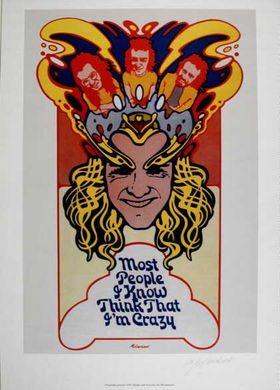 "Most People I Know
(Think That I'm Crazy)" had as much impact in its moment as "She's So
Fine", "The
Real Thing", "I'll Be
Gone" and "Eagle Rock", and it has become a definitive work of
Australian rock. It
was a huge hit for Thorpie and the new Aztecs, indubitably propelled to
the top of charts by
the band's triumphant appearance at the legendary 1972
Sunbury Festival.
Thorpe himself sees this as a pivotal moment in the development of
Australian music.
Much has been made of the promoters' decision to
feature an
all-Australian lineup,
rather than relying on imported stars, but it has to be acknowledged
that much of Sunbury's later stature derived simply from the fact that
it was recorded and filmed, and that the promoters probably
couldn't have afforded to bring in overseas acts anyway.
"Most People I Know
(Think That I'm Crazy)" had as much impact in its moment as "She's So
Fine", "The
Real Thing", "I'll Be
Gone" and "Eagle Rock", and it has become a definitive work of
Australian rock. It
was a huge hit for Thorpie and the new Aztecs, indubitably propelled to
the top of charts by
the band's triumphant appearance at the legendary 1972
Sunbury Festival.
Thorpe himself sees this as a pivotal moment in the development of
Australian music.
Much has been made of the promoters' decision to
feature an
all-Australian lineup,
rather than relying on imported stars, but it has to be acknowledged
that much of Sunbury's later stature derived simply from the fact that
it was recorded and filmed, and that the promoters probably
couldn't have afforded to bring in overseas acts anyway.
While by no means the first of Australia's outdoor rock festivals, for better or worse, Sunbury soon assumed the mantle of "Australia's Woodstock". It was held at the end of January, 1972, over the Australia Day long weekend. The venue was a natural amphitheatre site on farmland near Sunbury, a rural town north of Melbourne, Victoria. The Aztecs shared billing with Spectrum/Murtceps, The La De Das, Max Merritt & the Meteors, SCRA, Pirana, Greg Quill's Country Radio and many others. But the main event of the festival was undoubtedly Thorpie's triumphant appearance! The exhortation from the stage to "suck more piss!" has passed into folklore, as stoned and drunk punters, enjoying the ambience of a weekend of hard music, topless frolicking, easy drugs and free love, adopted Thorpie as the king of Oz Rock, and elevated him and his powerhouse band to the status of legend -- a status Billy has never quite lived down.
Part of the Aztecs' incendiary set, plus several of the other performers, was released on the landmark double-album recording Sunbury (EMI-HMV SOXLP 7561/2), and also on the film made of the event, Sunbury (Video release: Siren SIRVID 100). A double-album featuring the Aztecs' full set, Live at Sunbury, was later released by their new label, Havoc (HST 4003/4), complete with a die-cut 3D pop-up cartoon cover, depicting the group and friends in a festival tent, smoking hookas and looking out of it (as you do). This release, with full inserts and in mint condition, is much sought after by collectors today and the recordings have recently been renmastered and reissued by Aztec Music.
After the release of "Most People" (which had become a virtual anthem among young Aussies by this time), the group set about recording a follow-up. "Believe It Just Like Me" railed against radio's preponderant preference for overseas playlist fodder at the time, and while it was a worthy successor (and in a similar hard rocking style) to the mega-hit, it failed to emulate the success of "Most People".
Nevertheless, the plaudits earned by the band after its monumental Sunbury appearance stood it in good stead for its subassequent triumphs. Chatting with Ian 'Molly' Meldrum soon after the event, Billy observed:
"I never had any idea that the band had become this popular, but something like this really gives you an indication. It's been really worth it, coming from the beginning, it seems to have built up; coming from a hundred people to 40,000 - it's unbelievable! The point is, we don't need overseas names, this must be obvious here! The only way to promote Australian music, is to make it purely Australian music, and, I mean, it's good to bring in a group that is a good (overseas) group, but most of these festivals ... I don't see why we shouldn't use our bands here".
Another prominent feature that had manifested itself since Thorpe's move to Melbourne, and that by now had become synonymous with the Aztecs, was the volume. The band's manager, Michael Browning, coined a term that stuck: 'Aztec Energy'; describing the almost overwhelming power that the band generated from the stage. Billy had this to say about it to Go-Set's Meldrum in March, 1972:
"It was loud. Everything was loud. There was so much energy it was frightening in a way. I want to get much louder but the problem is that in this country the equipment can't handle it, and it just distorts so much of the sound. Hendrix was loud, but he was loud and clear".
1973
"Gonna create a disturbance in your mind..."
Thorpie's message in 1973 was without doubt loud and clear! He and the ever-chainging personnel of The Aztecs commanded a pre-eminent position in Aussie rock. While artists such as Ross Wilson, Mike Rudd, Lindsay Bjerre and Gulliver Smith strove to push out and pull down boundaries in their music, Thorpie and friends continued to provide high-octane, no-nonsense rock for the masses.
That is not to say that Billy's and the band's music lacked innovation or creativity musically. One of his tour-de-force concert staples at the time; exhilarating and provocative with its changes; was a fiercely-rocking piece called "Fuck On Stage" ("whaddaya mean I can't say fuck on stage?!') -- borne out of our hero's repeated arrests and detainments for the liberal use of that very word onstage! Another original concert chestnut from the time was "Mama". Here, each member of the band excelled with a solo turn, Billy's being a scat vocal unison guitar thing, with Gil's inventive and fulsome drum underpinnings consistently exciting. The old Ike and Tina Turner standard "Ooh Poo Pah Doo" proved perhaps the most durable of the classic 'Sunbury Aztecs' live song list, involving as it did a prolonged audience-band call and response interlude, a gleeful threat by the perpetrator (Thorpe) to "create a disturbance in your mind", culminating in some of the rawest, lewdest heavy blues jamming that even the most jaded of audiences had witnessed.
The band repeated their festival success at Sunbury '73 and enjoyed another triumph by again selling out the Myer Bowl in Melbourne. This particular coup supplied added poignancy after a couple of abortive excursions the band made to the UK earlier in the year. One reason the Marquee gigs in London are said to have failed is that volume! It was too much for the Brits, apparently!
In April 1973 Thorpe made a featured appearance as The Hawker in the all-star Australian orchestral concert production of The Who's Tommy. On the recording front, amidst the Aztecs' hectic performing schedule, he still found time to collaborate on quite a fine little album, it has to be said, with his long-time friend and at that time housemate, Warren "Pig" Morgan. The resulting album, Thumpin' Pig and Puffin' Billy (Downunda), is well worth seeking out, as is its pumping lead-off single, "Captain Straightman". Another curiosity of the time is the single Billy and Pig co-wrote and produced, with full Aztec backing, for the eccentric soul-blues singer Wendy Saddington. "Looking Through A Window" is a sensitively rendered epic ballad, well worth seeking out.
In August , Billy switched record labels from the independent Havoc (whose founder Frank Smith died suddenly during the year) to the newly-opened local division of Atlantic Records, which was by then a subsidary of the Warner group. Atlantic released the singles "Movie Queen" and "Don't You Know You're Changing?" in quick succession. Although the later singles of 1973 were ostensibly solo releases, they nonetheless featured most of the extant Aztecs line-up (with help from Chain pals Phil Manning and Barry Sullivan).
1974
Before disbanding, the Aztecs recorded one more album for
Atlantic. Right at the beginning of 1974, the More Arse Than
Class LP
came out,
provoking predictaqble cries of protest from conservatives about
the title and its 'disgusting' gatefold cover, which
opened out
to show the naked, hairy
posteriors of the four band members! The music on the record was where
the true arse was though -- and it
kicked it! It remains
the Aztecs most successful studio album, and apart from the undiluted
power of its music,
is a strong testament to the skills of erstwhile Aztec
drummer/producer/engineer/archivist
Gil Matthews. Also notable is the return on bass duties of Billy's old
cohort Teddy Toi.
1975 - 76
Billy's recorded output over the next two years consisted of two well-received, ostensibly solo albums for Festival, Million Dollar Bill (1975) and Pick Me Up & Play Me Loud (1976). The glorious, jazz-inflected single, "It's Almost Summer" was produced by Peter Dawkins. In a 2003 interview with writer Debbie Kruger, Billy recalled that "It's Almost Summer" was the fruit of his first flirtation with open guitar tunings. It was only a medium-sized hit at the time (and deserved greater success both here and overseas) but it has since become one of Billy's most enduring solo recordings and is certainly one of his best original songs. Enlisting the help of former Aztecs Matthews, Morgan and Toi, together with new guitarist and songwriter, Billy Kristian (ex Meteors), Billy continued to tour and remained a popular drawcard.
In 1975 Billy decided it was time to move on. His planned two-week stay in Melbourne in 1969 had evolved into a hugely successful eight year career as one of Australia's top rock performers, but by 1975 he had decided it was time to try something new. The members of The Aztecs were by this time going in different musical directions so Billy decided to mark the end of this phase of his career with a gala farewell concert at the new Sydney Opera house. It was recorded and filmed, with the audio released on the double-album Steamin' At The Opera House. The show consisted of three one-hour sets, the first acoustic, the second, an elaborately-staged concept suite called "No More War". The third set was an all-in all-star jam, reuniting Billy with Lobby Loyde, Kevin Murphy and Johnny Dick.
1977-present
Over the years since the early 70s, Billy wrote, produced tracks and performed on sessions for many artists including Jeff St John, Ronnie Charles, The Wild Cherries, Angry Anderson and Wendy Saddington. In the late 'Seventies, Billy decided to broaden his horizons, and moved with his family to Los Angeles, where he established a highly successful toy wholesaling business.
Billy made a strong and sustained effort to break into the American music scene, utilising such famed US sessioneers as Leland Sklar and Earl Slick to create a series of ambitious concept albums, beginning with the highly successful space-rock concept album Children Of The Sun (1976) which also marked the beginning of a long collaboration with producer Spencer Proffer. This was followed by 21st Century Man, Stimulation (a particular favourite of this author's) and East Of Eden's Gate. He also showed up in Mick Fleetwood's hobby band, Zoo, and returned occasionally to Australia for well-received spot appearances, often with a reunion of his old 70s Aztecs pals.
In the early '90s, Thorpe and family came back to Oz for good. Rejuvenated interest in Billy's amazing body of work led to the successful launch of a 3CD retrospective, Lock Up Your Mothers and national concerts again reuniting the classic Sunbury Aztecs line-up. Billy continued to record and found a lucrative sideline in advertising composition (like the "Friday Night Football" TV promo for the 9 Network). He also penned two highly entertaining (and essential) autobiographical books, and for someone who has done all he has in his life, he still looked remarkably trim and youthful as he neared his 60s.
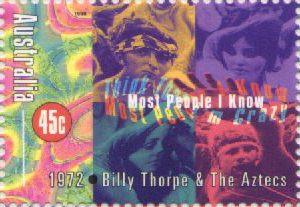
Billy Thorpe & The Aztecs' Sunbury triumph commemorated in Australia Post's 1998 Australian Rock stamp series
Billy continued to wow audiences into the 21st century, playing clubs and festivals with as much verve and power as he put out in his twenties and with the incendiary power of his extraordinary voice still completely intact. Among his many appearances in this period, a highlight for the lucky fans who saw it was his electrifying performance at the all-star "Gimme Ted" benefit in Sydney in 2001, and in 2002 Thorpie reunited with the original Aztecs for one more thrilling go-round as part of the now fabled "Long Way To The Top" concert tour.
During late 2006 and into early 2007 Billy continued to tour and record, as he worked on a landmark new "unplugged" project in which he revisited the songs from his 40-year career in an acoustic format, as well as an ambitious concept album. The new CD was virtually complete when, to the shock and dismay of all, our greatest road warrior was felled by a heart attack on 28 February 2007. The 'unpluggged' album was subsequently released on Michael Gudinski's Liberation Blue label as Solo: The Last Recordings.
It's fitting to close this brief overview of Billy's extraordinary career with the thoughts of one of his biggest fans, Angry Anderson:
"I've dreamt about that voice. I worship at the temple of that voice".
Reflections
Billy Thorpe interviewed by Tracey Curro of the Nine Network's 60 Minutes in 1994.
Tracey Curro: Okay Billy, this is your one
chance to
dispel once and for all; all of the
myths about your life as a rock 'n' roll star.
Billy Thorpe: Oh, good! (laughs)
TC: Yes or no: were there drugs?
BT: Yes
TC: Booze?
BT: Yes
TC:Groupies?
BT: Yes
TC: Clashes with the law?
BT: Yes
TC: Trashing hotel rooms?
BT: Yes
TC: You blew it!
BT: A-ha-ha-ha!!!! I used to like it when they
threw the knickers on the stage, that was nice (laughs)...Now they
throw their wheelchairs
and crutches, y'know?
TC: You don't feel like, er, you're a bit
past it,
or it's a bit past you?
BT: No! Why? What's a bit past me?
TC: This!
(Tracey gestures to her surroundings; the preparations for an Aztecs
reunion gig)
BT: This?
TC: Being a rock 'n' roller
BT: It's like sex darling, yeah, it really is!
TC: Tell me Billy!
BT: (laughs heartily)... yeah, you can enjoy it as
long as you can!
TC: There's one song from that (early) era that I
think still stands at the top for the most creative lyrics in musical
history
BT: "Mashed Potato"?
TC: You got it!
BT:(hearty laughter)
TC: So just let me get it right - there were three
words in the song, weren't there?
BT: "Mashed potato, yeah". And I think mashed
potato was repeated something like a hundred times in the song
TC: Right, so the verse was...
BT: (sings) Mashed potato, yeah, yeah, yeah...that
was it!
TC: And the chorus?
BT: (sings) Mashed potato, yeah, yeah...(laughs).
When I listen to the original, I mean the original by Rufus Thomas was
like: (renders song in big solid bluesy style)...but ours was like:
(pinches nose and gives weedy, anemic reading). Heh, it was just
ridiculous! Like wind-up toys!
BT: There were kids climbing up the front of hotels,
there were girls in closets, under
beds, in the showers. Everywhere we went it was that whole hysteria
thing - kids chasing
us down the street, tearing clothes off, you know, hanging onto the top
of cars. One girl got
really badly hurt 'cos she jumped on top of a car and it went round a
corner and she spun
off and went through a shop window. (While onstage) they all hit the
stage at once and
one of them runs at me and slides in her own slime across the stage and
took my legs
out from underneath me, you know
TC: Did that feel like adoration?
BT: Oh, it felt like pain! (laughs). It was
pandemonium!
Looking over some old photos and memorabilia with Glenn A
Baker:
BT: Look at us, isn't that...(laughs)
TC: What an angel!
GAB:Look at you there - where did you get a suit
like that?
BT: Now you know where Johnny Farnham got his whole
thing from - look at this!
GAB: How can anyone possibly look that cherubic,
that wholesome and well-scrubbed?
BT: I was pretty, wasn't I? My God Glenn, where do
you get all this stuff?
GAB: Remember The Aztecs in the Sunbury years used
to fly around in that
great private plane, that Italian troop transport?
BT: One of the planes we had, crashed at
Healesville, crashed in the mud and we all ended up in the lake. I
remember the roadie saying to me, "come on hurry up, we're on in ten
minutes!"
(laughing)...We're all in the plane going "oohhhhh!"
BT: In Dubbo it was one of these things that after
the show, the hotel threw on a gala feast for the band and one of
the guys in the band pulled a girl, and it turned out to be the mayor's
daughter, and before
we knew it...
TC: Big mistake
BT: Big mistake. And there were guys outside in
pickup trucks with shotguns and we were unceremoniously asked to
leave the town, and: "piss off and don't come back!" Ah-ha-ha-ha!!!
TC: Was Dubbo the only place that happened?
BT: No. No, no, no, it happened a lot. (Merrily
chuckling)
On Billy's relocation to Los Angeles:
BT: I thought, I just gotta get outta here; I'm
gonna end up with a bow-tie singing "Over The Rainbow" in leagues clubs
for
the rest of my life. I've got to go! So I did, I just went shoosh!
TC: And how long did it take you to make your first
million in the States?
BT: Not that long actually, ha ha
Trying on clothes in an LA boutique:
BT: See, this is what keeps you young, instead of
buying suits and ties, you buy this sort of shit! (modelling natty
buckskin
jacket). And you act half your age! (swaggers off)...
(Now joined by daughters Lauren and Rusty, and wife Lynn):
Rusty: (I remember my) parents showing up in their
leather jackets and their jeans and boots to
conservative school functions (laughs)
BT: 'Cos they went to private schools, you know,
er, very right-wing, republican, very straight Ivy League kinda people,
and we'd turn up to the meetings and we were always just...
Rusty: You wore a shiny suit that one time (much
laughter). To the father-daughter banquet, he
shows up in this, like, shiny teal green suit!
BT: Ha ha! See, there was a period where, when I
had really long hair they were embarrassed by me, y'know: "why
don'tcha get your hair cut?" And then, as they got older, it became
cool.
Lauren:He's cool again now.
BT: I'm cool now, y'see? Ha ha ha. But they've been
great - their friends love me!
Lauren: All my guy friends are in love with my mom,
and all the girls think my dad's cute.
BT: Well (my daughters) think I'm crazy, y'know.
Lynn: Billy hid his old videos because they laughed
so hard.
BT: Every time people came round the house, the
kids'd put the damn
videos on! They've got heaps of their friends, looking at me when I
was...
Lauren:
Singing "Poison Ivy".
BT: ...singing "Poison Ivy" to uproarious laughter,
so I hid 'em! (family laughing)
BT: I've never liked the sound of my own
voice. I can't listen to my own records. I mean I like to talk, as you
know, but I only started to
enjoy the sound of my own singing in the last couple of years, 'cos I
think my voice has
matured. 'Cos it was always so thin (pinches nose), like "blliiirrrp!"
So I could
never work out why I was as popular as I was!
TC: Do you still have enough
energy to do The Stomp?
BT: (emphatically) No
TC: Well, I
don't really know what The Stomp is...
BT: I'm not gonna show you Trace!
(laughs)
(Next scene: Billy and his daughters re-create a very credible Stomp
for the
cameras)
On Billy and his family's return to live in Australia, and the
release of the 3-CD
anthology:
BT: So many people come up to me in the street with
fond
memories attached to the various eras that I was a part of; and
particularly records that I
made and: "my wife and I got married, we played this records of yours",
or "this was
playing on a jukebox when we met"...And, I mean, from politicians to
truck drivers! It's
incredible! I'd forgotten just how big we were and how many people we
played to. ("Lock
Up Your Mothers") is the second coming of the anti-Christ, y'know?
TC:
(displaying LP cover) I have to ask you about this album, and
I haven't got the whole
LP, just this picture (which depicts four trouserless Aztecs
photographed from the rear)...
BT: Oh, "More Arse Than Class"?
TC: We're wondering which
one was yours, and our guess is (points), it's that one
BT: Ah! You think I've
got that tight little one do you?
TC: (embarrassed giggling)
BT:
It is actually, yeah. Ha ha, it's certainly not that hairy
one on the right!
TC:
So what would you say you have today, more class than arse?
BT: No,
still more arse than class - definitely! Ha ha ha ha!!!
60 Minutes: Tick, tick,
tick, tick....
Recollections of a fan's meeting by Paul Culnane
By crikey it was loud! The evening in early 1972, when I lugged my 2-track stereo tape deck along to the Canberra Theatre to record my friends Snibbo in concert, led to a very exciting encounter. For the headlining band that night was Billy Thorpe and the Aztecs, fresh from their Sunbury triumph. Boldly enough, I decided to approach Billy and ask him if I could record his performance. He graciously allowed me to, no questions asked.
The atmosphere was electric as the capacity crowd restlessly awaited the band's appearance. I positioned my two crappy microphones on either side of the stage, facing the two humungous blue towers of Jands W-bin front-of-house speakers. This primitive recording approach proved quite efficacious when recording Snibbo and I captured a clear, balanced recording of their set. It was to be quite a different kettle of decibels for the main act however...
A lack of proper long leads and connections meant that for the whole performance I had to take up a spot directly behind Billy's amplifier stack at centre stage. As the band plugged in and Billy let rip with a deafening blast of feedback to open "Be Bop A Lula", the sound in my headphones (and what was registering on the VU meters) resembled nothing so much as sticking one's head into the engines of a jumbo jet in full flight! It was bloody excruciating! I've a shrewd suspicion that Billy, or at least his sound engineer, had discovered the "eleven" position on the volume controls long before Nigel Tufnel did.
After the show, while I was packing up my gear, Thorpie ambled over and asked to listen to my tape. I was embarrassed because I knew that it consisted basically of white noise, but sheepishly handed over the "cans" to Billy who listened intently, and displayed genuine interest in the recording. He beckoned his drummer and erstwhile recording engineer, Gil Matthews over for a listen. I'm not sure whether their grins were the result of the distorted sound they were hearing, or that they were enjoying hearing back aspects of what was a storming set. Gil and I spent some minutes discussing recording and he was very encouraging to me, suggesting that I should pursue my hobby as a career. In fact, two nicer, more down to earth blokes you couldn't hope to meet. They made me feel special, something that Billy in particular was known to do with most fans with whom he came in contact. The band might have looked forbiddingly like rock stars, but they never allowed themselves to become distant or unattainable to the core of people who provided their support.
I've still got that tape. I'm listening to it as I write this and it sounds atrocious. But the memories have come flooding back, of a truly awesome night in the company of the legendary Thorpie and his Aztecs.
My ears seem to have returned to relative normality too, thankfully!
Original article by Paul Culnane, 1999 (revised 2007)
Discography
Singles
Apr. 1964
"Blue Day" / "You Don't Love Me" (Linda Lee LL-006)
Jun. 1964
"Poison Ivy" / "Broken Things" (Linda Lee LL-007)
Jun. 1964
"Blue Day" / "You Don't Love Me" (Festival FK-650)
Aug. 1964
"Mashed Potato" / "Don't Cha Know" (Parlophone A-8119)
Oct. 1964
"Sick & Tired" / "About Love" (Parlophone A-8131)
Nov. 1964
"Smoke & Stack" / "Board Boogie" (Linda Lee HK-765)
Dec. 1964
"Over The Rainbow" / "That I Love" (Parlophone A-8136)
May 1965
"I Told The Brook / Funny Face (Parlophone A-8158)
Jul. 1965
"Twilight Time" / "My Girl Josephine" (Parlophone A-8165)
Sep. 1965
"Hallelujah I Love Her So" / "Baby Hold Me Close" (Parlophone A-8170)
Oct. 1965
"Poison Ivy" / "Blue Day" (Linda Lee HK-1116)
Nov. 1965
"Love Letters" / "Dancing In The Street" (Parlophone A 8180)
Jun. 1966
"Word For Today" / "The New Breed" (Parlophone A-8208)
Oct. 1966
"I've Been Wrong Before" / "Wee Bit More Of Your Lovin' " (Parlophone
A-8220)
Sep. 1967
"Dream Baby" / "You Don't Live Twice" (Festival FK-2015)
Mar. 1970
"Good Morning Little School Girl" / "Rock Me Baby" (Festival FK-3638)
? 1971
"The Dawn Song" / "Time to Live" (Havoc H-1003)
Feb. 1972
"Most People I Know" / "Regulation Three Puff" (Havoc H-1012)
Oct. 1972
"Believe It Just Like Me" / "Get To Hell Out of Here" (Havoc H-1014)
? 1973
"Captain Straightman" / "Bow My Head" (Havoc H-1019)
Aug. 1973
"Movie Queen" / "Mame" (Atlantic 10020)
Aug. 1973
"Don't You Know You're Changing?" / "Yes I'm Tired" (Atlantic 10029)
Apr. 1974
"Over The Rainbow" / "Let's Have A Party" (Atlantic 10035)
1974
"Cigarettes and Whiskey" / "Back Home in Australia" (Atlantic 10043)
Nov. 1975
"It's Almost Summer" / "Drive My Car" (Infinity K-6202)
EPs
Aug. 1964
Poison Ivy
(Linda Lee HX-10834)
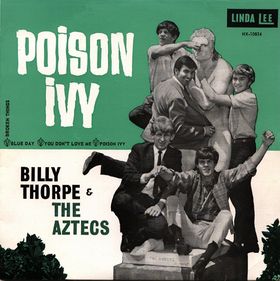
"Poison Ivy" / "Broken Things" // "Blue Day" / "You Don't Love Me"
Jan. 1965
Sick & Tired (Parlophone GEPO 70018)
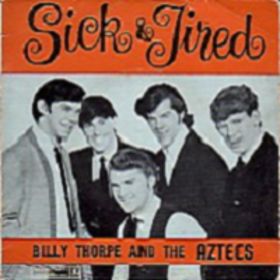
"Sick & Tired" / "Mashed Potato" // "About Love" / "Don'tcha
Know"
Apr. 1965
Billy Thorpe & The Aztecs On Stage (Parlophone
GEPO
70022)
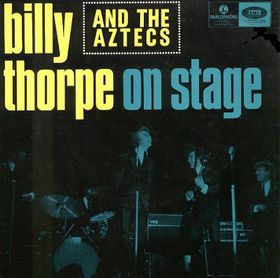
"Zip A Dee Doo Dah" / "Jenny Jenny" // "What I'd Say" / "I'm A Hog For
You"
Sep. 1965
I Told The Brook (Parlophone GEPO 70023)
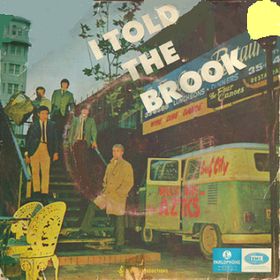
"I Told The Brook" / "Over the Rainbow" // "That I Love" / "Funny Face"
Nov. 1965
Stand By Me
(Parlophone GEPO 70025)
"Stand By Me" / "My Babe" // "High
Heeled Sneakers" / "Half As Much"
Twilight Time
(Parlophone GEPO 70027)
"Twilight Time" / "Hallelujah I Love Her
So" // "Baby Hold Me Close" / "Hello Josephine"
Love Letters
(Parlophone GEPO 70039)
"Love Letters" / "Dancing In The Street"
// "The New Breed" / "Wee Bit More of Your Loving"
Albums
1964
Poison Ivy
(Linda Lee DL 31391)
re-released in 1967 as (Calendar R66-537).
"Blue Day" (Tony Barber)
"Board Boogie (Vince Maloney)
"Broken Things" (Tony Barber)
"Poison Ivy" (Jerry Lieber - Mike Stoller)
"Smoke & Stack" (Val Jones)
"You Don't Love Me" (Tony Barber)
1964
Billy Thorpe and the
Aztecs (Parlophone
PMCO 7525)
"I'm Talking About You"
"Half As Much"
I'll Never Get Over You"
"Some Other Guy"
"High Heeled Sneakers"
"Pride"
"Stand By Me"
Devoted To You"
"When You Walk In The Room
"Skinny Minnie"
"The Cruel Sea" (Instrumental)
"I Call Your Name"
Note: The first Aztec line-up's 1965 debut album proper. The bulk of
the LP
consisted of the Alberts' hits of the time, together with tracks
featured on b-sides, EPs and
early "hits" collections.
1965
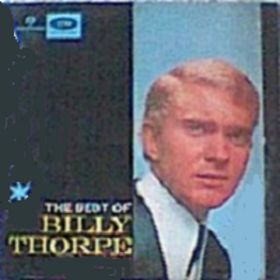 |
The Best
Of Billy Thorpe & the Aztecs
(Parlophone PMCO-7528) |
1966
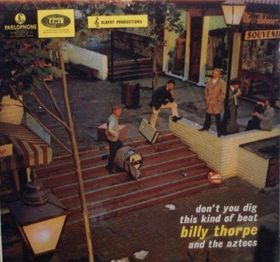 |
Don't You
Dig This Kind Of Beat? (Parlophone PMCO-7529)
|
1968
 |
I Got A Woman
(Music for Pleasure
MFPA-8060) Reissue of Don't You Dig This Kind Of Beat? on Paul Hamlyn's Music For Pleasure budget label |
1971
 |
The Hoax is Over
(Infinity SINL-934092) LP Side 1: "Gangster Of Love" (Watson) 24:35 "Goodbye Baby" (Thorpe) 3:34 Side 2: "Mississippi" (Thorpe) 19:35 "Truth" (Thorpe) 4:05 |
1971
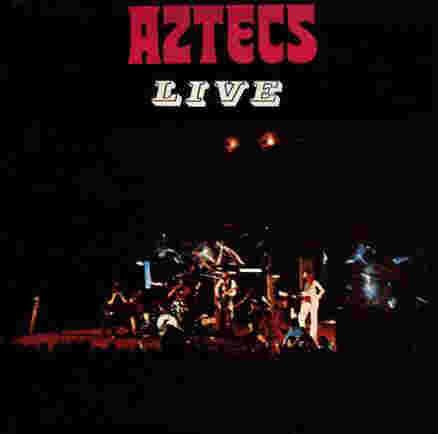 |
Aztecs
Live (Havoc HST-4001) LP |
1972
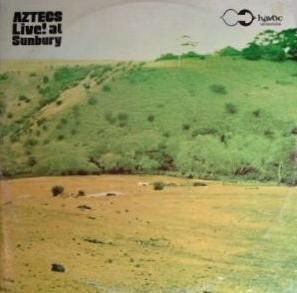 |
Aztecs
Live! at Sunbury (Havoc HST-4003/4) 2LP |
1973
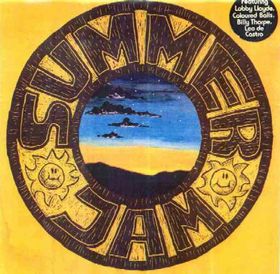 |
Summer Jam
(live at Sunbury '73) with Leo De Castro and Lobby Lloyde & The
Coloured Balls |
1973
 |
Thumpin' Pig and Puffin' Billy -
Downunda (Atlantic SD-1014) Billy Thorpe & Warren Morgan "Bow My Head" "Captain Straightman" "Early Morning" (Thorpe) "I've Cried Over You" "Just For You" (Morgan) "Mister Man" "Mothers & Fathers" (Wendy Saddington - Billy Thorpe) "Moving With Rock" (Morgan) "Sunny Day" (Morgan) "You Look After Me" All songs written and produced by Warren Morgan and Billy Thorpe (except as shown) |
1974
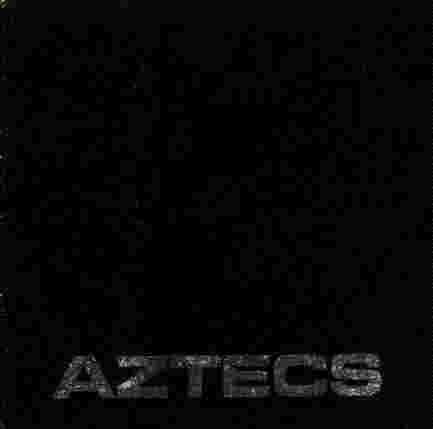 |
More Arse Than Class
(Atlantic SDF-1097) Side 1: "Boogie Woogie" "Walking Down the Street" "Don't You Know You're Changing" "No More War" Side 2: "I Wanna Know" "Back On The Road Again" "Slowly Learning How" |
1974
 |
Steaming
At The Opera House (Atlantic 600010) 2LP |
1975
 |
Gold (Atlantic
600015) |
1975
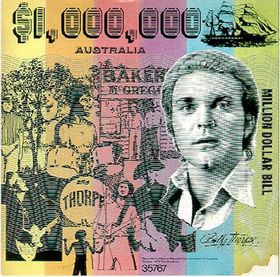 |
Million
Dollar Bill (Festival L-35767) |
1976
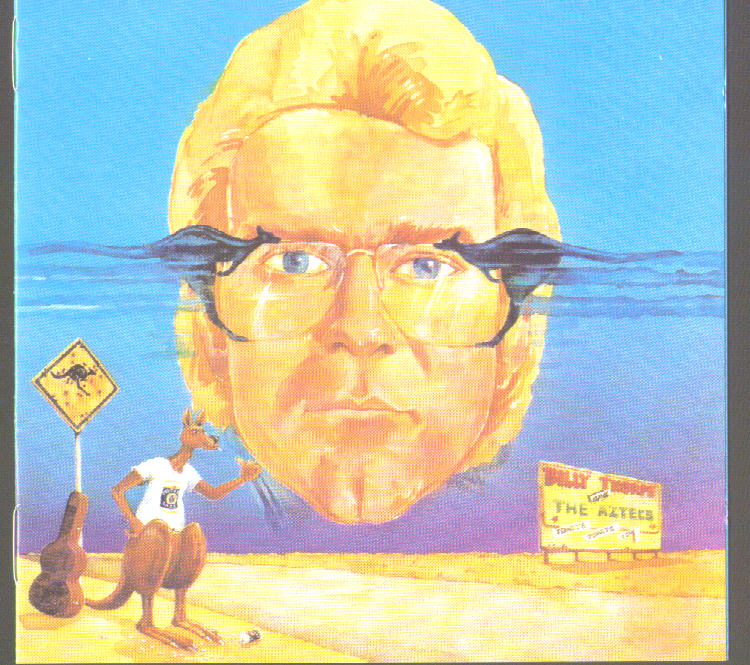 |
Pick Me
Up & Play Me Loud (Festival L-35964) LP
/ Mushroom 19776 CD, 1994) . |
1979
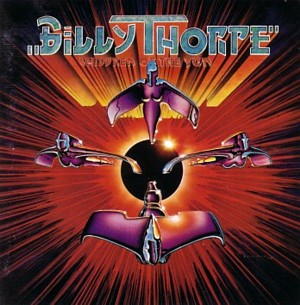 |
Children Of The Sun
(Capricorn) Side 1: 1. "Wrapped in the Chains of Your Love" 3:38 2. "Dream-Maker" 3:45 3. "Simple Life" 5:38 4. "Goddess of the Night" 4:22 Side 2: 1.. Children of the Sun" 6:45 2. We're Leaving" 3:53 3. We Welcome You" 4:42 4. Solar Anthem" 0:55 5. The Beginning" 4:15 Produced by Spencer Proffer and Billy Thorpe |
1980
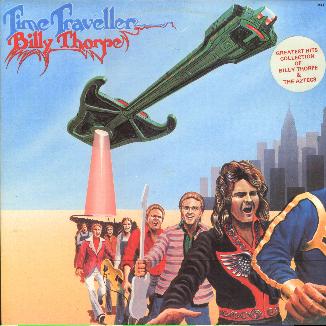 |
Time
Traveller (Blue Goose MLR-2335) LP "Bassballs" (Billy Kristian - Billy Thorpe) "Be-Bop a-Lula" (Vincent - David) "Boogie Woogie" (Billy Thorpe) "Captain Straightman" (Billy Thorpe -Warren Morgan) "Cigarettes & Whisky" (Traditional) "Dawn Song" (Billy Thorpe - Warren Morgan) "Funny Face" (T Crane) "I Am The Sea" (Lobby Loyde) "It's Almost Summer" (Billy Thorpe) "Love Letters" (Young - Hayman) "Mashed Potato" (Rozier) "Most People I Know" (Billy Thorpe) "Movin' On A Sound" (Billy Thorpe) "Ooh Poo Pah Doo" (Jesse Hill) "Out in the Street Again" (Lawrence Mekler) * "Over the Rainbow" (Arlen - Harburg) "Poison Ivy" (Jerry Leiber - Mike Stoller) "Sick & Tired" (Kenner - Bartholomew) "Time to Live" (Billy Thorpe - Warren Morgan) Compiled by Gil "Rathead" Matthews Note: Double-LP compilation of (mostly) second-phase Thorpe career. Recommended if you can find it. * Studio track "Out on the Street Again" is exclusive to this album. |
1980
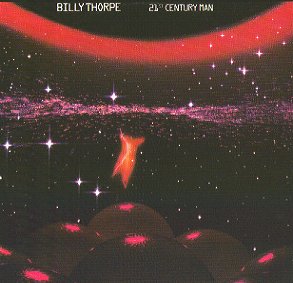 |
21st Century Man
(Mushroom / Elektra USA) Produced by Spencer Proffer and Billy Thorpe |
1981
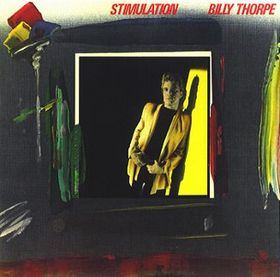 |
Stimulation
(Mushroom / Pasha/CBS ARZ 37499) |
1981
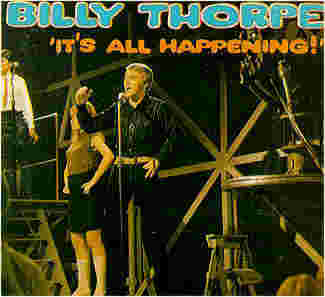 |
It's All
Happening!
(EMI / Albert Productions APLP 050) later reissued
on CD
|
1982
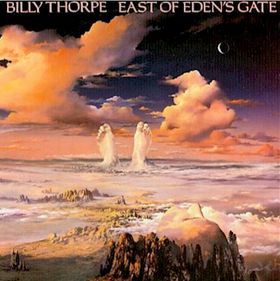 |
East Of Eden's Gate
(Pasha/CBS FZ-38179) Side 1: 1. "East of Eden's Gate" 6:19 2. "Edge of Madness" 4:27 3. "Hold on to Your Dream" 3:29 4. "While You're Still Young" 4:05 5. "No Show Tonight" 4:06 Side 2: 1. "I Can't Stand It" 5:14 2. "Nite Rites" 3:39 3. "Cruisin' (The Town in the Heat of the Night)" 3:46 4. "Dogs of War (Flesh and Blood)" 7:20 Produced by Spencer Proffer and Billy Thorpe |
1987
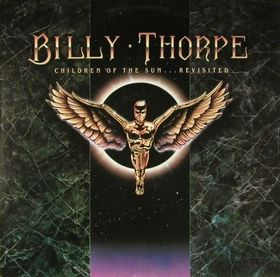 |
Children
Of The Sun ...Revisited (Pasha/CBS) CD |
20-track compilation, shared with Normie Rowe, Ray Brown and Stevie
Wright
(and a nifty and cheap way to gather five early hits each, from four
Aussie rock legends,
together on one CD).
Includes the following Aztecs tracks: "Poison Ivy"
/ "Mashed Potato" / "Sick & Tired" / "Over The Rainbow" /
"Twilight Time".
May 1994
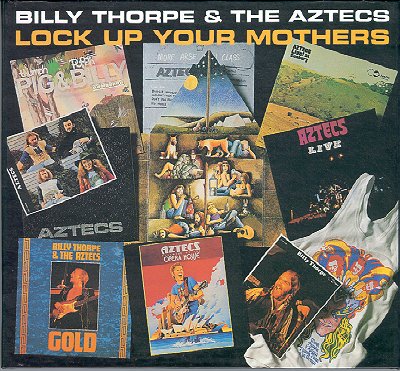 |
Lock Up
Your Mothers (Mushroom D-80968) 3CD
anthology "Rock Me Baby" (King - Hosea) "Good Morning Li'l Schoolgirl" (Willie Dixon) 1969 single a & b, produced by Billy Thorpe "Gangster of Love" (Watson) "Goodbye Baby" (Billy Thorpe) "Born In Mississippi" (Billy Thorpe) "Truth" (Billy Thorpe) (From The Hoax Is Over, produced by Billy Thorpe, engineered by Ernie Rose at Armstrong's, Melbourne) "Somebody Left Me Crying" (Billy Thorpe - Warren Morgan) "Time To Live" (Billy Thorpe - Warren Morgan) "Be Bop A Lula" (Davis - Vincent) Live at Melbourne Town Hall, 1971 "The Dawn Song" (Billy Thorpe - Warren Morgan) "Most People I Know (Think That I'm Crazy)" (Billy Thorpe) "Believe It Just Like Me" (Billy Thorpe) (1971-72 single tracks. Produced and engineered by Gil Matthews) "Roll Over Beethoven" / "Jenny Jenny" (Chuck Berry-Johnson-Penniman) "I Ain't Goin' Down Again" (Billy Thorpe) "Three Pigs" (Billy Thorpe) (Live at Melbourne Festival Hall 1972 - previously unreleased radio recordings) "CC Rider" (Rainey) "Be Bop A Lula" (Davis - Vincent) "Mama" (Billy Thorpe - Warren Morgan) "Rock Me Baby" (King - Hosea) "Jump Back" (Thomas) (Live at Sunbury, 1972. Recorded at TCS; engineered by John French) "It Won't Be Long" (Billy Thorpe) "Ooh Poo Pah Doo" (Hill) (Live at Melbourne Myer Music Bowl. Previously unreleased radio recordings) "Rock Me Baby" (King - Hosea) "Sick 'n' Tired" (Kenner - Bartholomew -Domino) "Poison Ivy" (Jerry Leiber - Mike Stoller) ("Goofing off" at Armstrong's Studios, Melbourne, 1973, during sessions for More Arse Than Class... Previously unreleased studio recordings produced by Billy Thorpe and Gil Matthews (who features on guitar) "Captain Straightman" (Billy Thorpe - Warren Morgan) (Single produced by Warren Morgan and Billy Thorpe) "Boogie Woogie" (Billy Thorpe) "No More War" (Billy Thorpe) "Back On The Road Again" (Billy Thorpe) "Slowly Learning How" (Billy Thorpe) (From More Arse Than Class, 1973, produced and engineered by Gil Matthews at Armstrong's, Melbourne) "Movie Queen" (Billy Thorpe) "Mame" (Billy Thorpe) (Single a & b, produced and engineered by Gil Matthews at Armstrong's, Melbourne) "Let's Have A Party" (Jackson) "Somewhere Over The Rainbow" (Arlen -Harburg) "New Orleans" (Guida - Royster) (Live at Sunbury, 1973. Production details unknown) "Back Home In Australia" (Billy Thorpe) "One Day You'll Lose It" (Billy Thorpe) "Ball Biter" (Billy Thorpe) (Live at the Sydney Opera House, 1973. Produced and engineered by Gil Matthews) Digital editing and assembly by Billy Thorpe at Encino Recorders, California Digital mastering by Gil Matthews |
1994
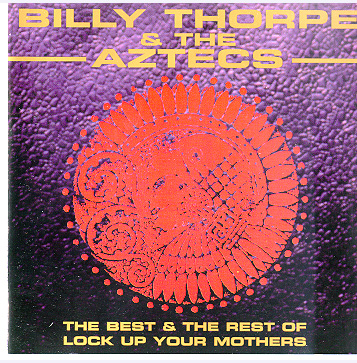 |
The Best And The Rest of Lock Up Your Mothers (Mushroom D 98009) CD
1. "Rock'n'Roll City" |
2007
| Solo - The Last Recordings (Liberation Blue) |
Video, books and other collectables
Good Times
(EMI-Alberts Video, cat # unknown)
Compilation of
Alberts Records acts; includes complete clips of Aztecs mark I live -
"Sick & Tired", "Over
The Rainbow". It is not known whether the later revamped version of
this title still includes
Aztecs footage
Sunbury
(Siren Entertainment Video SIRVID 100)
Thorough film
document of the 1972 rock festival, with much dynamic Thorpie
coverage.
Sex And Thugs
And Rock And Roll
Most People I Know Think
That I'm Crazy (MacMillan
Press)
Two essential reads, from Thorpie's own hand,
that'll fill in a whole lotta blanks in his fantastic saga, yet will
surely leave other crucial
blanks unfilled. While you're re-living the music, do read these books,
they're friggin'
hilarious!! Oh, and there's really nothing to be ashamed of, if you're
harbouring a yellowing
old Sunbury tanktop. Let us know if you are! Reissued in a
commemorative two-for-one edition at the time of Thorpie's death.
Billy
Thorpe/Aztecs film-clips and TV appearances on YouTube:
Billy Thorpe & The Aztecs - "Sick and Tired", live in concert
ca. 1964
http://www.youtube.com/watch?v=1WTfZobWE-M
Billy Thorpe with Running Jumping Standing Still, 1968
http://www.youtube.com/watch?v=aD-_FI2no_g
Aztecs perform "Mama" live on GTK ca. 1971
http://www.youtube.com/watch?v=7sSDrDQ0VEU
Aztecs live, 1970s - "Heartbreak Hotel"
http://www.youtube.com/watch?v=76FVtFRptCE
Aztecs live on GTK ca. 1972 - "Movie Queen"
http://www.youtube.com/watch?v=R2z7KVKuJoE
Aztecs jamming live on GTK ca. 1972
http://www.youtube.com/watch?v=CTkNhfpeBtA
"Most People I Know" live at Sunbury, Jan. 1972
http://www.youtube.com/watch?v=qRUUWjCWTOQ
Aztecs live on GTK(?) - "CC Rider"
http://www.youtube.com/watch?v=l0j20J3nxpQ
Billy Thorpe - "It's Almost Summer" 1975 film-clip
http://www.youtube.com/watch?v=659BB5W838I
References / Links
Billy Thorpe
official website
http://www.thorpie.com
Glenn A. Baker
- liner notes from "It's All Happening!"(1990)
Tracey Curro
- interview for the Nine Network's 60 Minutes(Nine Network, 1994)
Murray
Engleheart
- liner notes from Lock
Up Your Mothers CD anthology (Mushroom, 1994)
Ian Meldrum
- interview after '72 Sunbury concert - from the film
Billy Thorpe
liner notes from Lock
Up Your Mothers CD
anthology (Mushroom, 1994)
Ian McFarlane
Encyclopedia of
Australian Rock & Pop (Allen
& Unwin, 1999)
Australian Rock
Database: Billy Thorpe
http://hem2.passagen.se/honga/database/t/thorpebilly.html
Rate Your Music: Billy Thorpe
http://rateyourmusic.com/artist/billy_thorpe